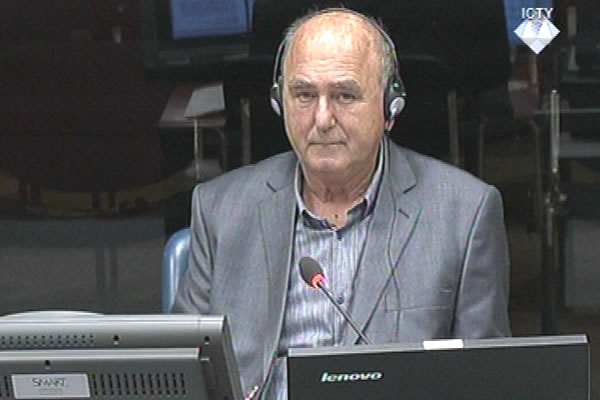Home
NO ONE COULD EAVESDROP ON MLADIC... OR COULD THEY?
The prosecutor contested the claims made by the defense military prosecutor Mile Dosenovic that the Bosnian Serb military communications were so well protected that it was almost impossible to intercept them. The prosecutor presented a number of orders issued by Ratko Mladic and other VRS officers which state that the enemy was ‘intensively and continually’ monitoring the Serb communications
 Mile Dosenovic, witness at the Ratko Mladic trial
Mile Dosenovic, witness at the Ratko Mladic trial In the two days of cross-examining VRS colonel Mile Dosenovic, prosecutor Peter McCloskey tried to refute the witness’s claims that the BH Army was unable to intercept Serb conversations and documents during the war in BH. The prosecutor’s goal was to prove the authenticity of a number of intercepted conversations between Mladic’s Main Staff and subordinated units, focusing specifically on the intercepts pertaining to the Srebrenica operation in July 1995. Dosenovic, who was the head of the communications in the 2nd Krajina Corps during the war, testified as the defense’s military communications expert.
The Serb side knew about the BH Army’s ability to intercept the conversations of the Bosnian Serb military and political leadership, the prosecutor noted. To corroborate it, the prosecutor showed two documents. In the first document, dating from June 1992, the war-time commander of the 2nd Krajina Corps warns that the ‘Green Berets unit, the Croatian Army and the foreign countries intensively monitor our communications’. The second document was dispatched from the Main Staff on behalf of General Mladic in June 1995. According to the document, the ‘enemy has been continually and very effectively using the intelligence obtained monitoring our radio, radio relay and postal communications’.
Contrary to the claims of his war-time superiors, Colonel Dosenovic said that there had been no large-scale surveillance and interception effort targeting the Bosnian Serb army communications. Mostly, there were isolated cases of people using open communications irresponsibly, thus making it possible for the BH Army to intercept them. That, according to the witness, didn’t jeopardize the VRS combat readiness.
The key piece of evidence in the prosecution's possession that the BH Army was able to eavesdrop on the Bosnian Serb military highest command is the existence of VRS documents that closely mirror the BH Army records of those documents. Furthermore, the prosecutor played the audio recording of an intercepted conversation between Bosnian Serb military officers. As alleged by the prosecutor, the intercept shows clearly that it was possible to eavesdrop on the VRS’s two-channel radio relay communications.
In his expert report, the defense witness said that there was no line of sight between the BH Army’s north and south surveillance posts on the one side, and the Drina Corps command in Vlasenica on the other. It was thus impossible for communications to be intercepted. ‘If you can’t see me, you can’t hear me’, the witness put it.
The witness reached this conclusion based on the calculations that the town of Vlasenica was at 620 meters above sea level, and the two surveillance posts of the BH Army were at 685 and 690 meters above sea level respectively. The witness claimed that there were physical obstacles between the two sides and thus there was no line of sight. On the other hand, the prosecutor noted that the OTP investigators had visited the locations and established, using two GPS devices, that the Drina Corps command was at 672 meters above sea level. That would imply that the line of sight, and consequently radio communication, between the surveillance posts and the Drina Corps command was possible. All it took was to place aerials on a tall building, for instance on the roof of the Drina Corps building.
Colonel Dosenovic completed his evidence today. Ratko Mladic’s trial continues tomorrow.
Linked Reports
- Case : Mladic
- 2015-08-13 MLADIC’S EXPERT TESTIFIES ABOUT INTERCEPTED CONVERSATIONS
- 2015-08-12 COMMANDER AT WEDDING, TROOPS AT EXECUTION SITES
- 2015-08-11 WAS DESTRUCTION OF MOSQUES ‘HAPHAZARD’ OR ORGANIZED?
- 2015-08-19 WHO TERRORIZED WHOM IN SARAJEVO
- 2015-08-20 MARRIED COUPLE CONFIRMS MLADIC’S ALIBI
- 2015-08-24 DEFENSE EXPERT: PROSECUTION ‘MIXING APPLES AND ORANGES’
